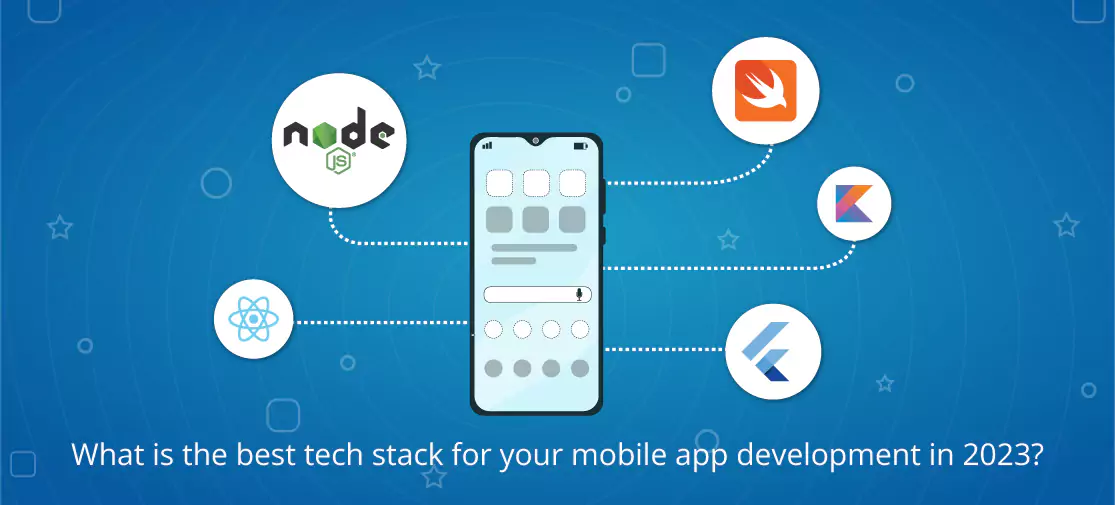Introduction
Welcome to the future of mobile app development! As we enter the year 2023, we can expect an even greater surge in the demand for mobile applications. The mobile app market is growing at an exponential rate, and there are currently over 4 million apps available on various app stores. Developers who want to keep up with this trend need to be equipped with the right tech stack to build their applications. In this article, we'll be exploring some of the most innovative and cutting-edge tech stacks for mobile app development in 2023.
Mobile app development is a rapidly evolving field, with new technologies and frameworks constantly emerging. In 2023, developers looking to create a mobile app will need to carefully consider their tech stack to ensure they are using the most effective tools and practices for their project.When it comes to native mobile app development, there are several tech stacks that stand out as top contenders. Swift and Kotlin, for example, are both programming languages developed by Apple and Google, respectively, that offer a range of features and capabilities ideal for building native mobile apps. In addition, they are both user-friendly and easy to learn, making them great choices for developers of all skill levels.
Another popular option for native mobile app development is React Native. This framework allows developers to create native mobile apps using the React library, which is primarily used for building web applications. React Native is known for its ability to write code once and deploy it on multiple platforms, which can save developers time and resources while still creating a high-performing and visually appealing app.For those looking for a newer, more innovative option for native mobile app development, Flutter is a great choice. Developed by Google, Flutter allows developers to create highly performant apps that look and feel native on both iOS and Android platforms. In addition, Flutter offers a wide range of pre-built widgets that can be used to create complex UI components quickly and easily.
When it comes to hybrid mobile app development, there are several tech stacks that are worth considering as well. Ionic is a popular open-source framework that allows developers to build hybrid mobile apps using web technologies such as HTML, CSS, and JavaScript. With its pre-built UI components and cross-platform compatibility, Ionic is an ideal choice for those looking to create an app that looks and feels native on multiple platforms.Another option for hybrid mobile app development is to combine React Native with Ionic. This can be a powerful way to create a hybrid app that takes advantage of the benefits of both frameworks. By using React Native, developers can create native components that are optimized for each platform, while using Ionic to create web-based components that can be used across multiple platforms.
In 2023, the world of mobile app development is expected to continue its rapid evolution, with new technologies and frameworks constantly emerging. This can make it difficult for developers to choose the best tech stack for their mobile app development project. However, by taking into account the current trends and the capabilities of different technologies, it's possible to identify the most effective tech stacks for mobile app development in 2023.
What is a tech stack?
Tech stack - the term sounds like something out of a sci-fi movie, doesn't it? But in reality, a tech stack is simply a combination of software technologies that developers use to build their apps. It's like a toolbox filled with programming languages, frameworks, libraries, and other tools. The choice of tech stack can vary depending on the needs of the project, budget, and scalability requirements.
Best tech stack for mobile app development in 2023
Here are some of the best tech stacks for mobile app development that will rock the world in 2023:
React native - the futuristic choice
React Native is a futuristic tech stack for mobile app development. It is a JavaScript framework that allows developers to create native mobile apps that run on both iOS and Android platforms. With React Native, developers can build high-performance apps that offer a seamless user experience. It also has a large community of developers who continuously create new tools and resources for it.
Flutter - the dynamic choice
Flutter is another dynamic tech stack for mobile app development. It's an open-source framework created by Google, and it uses the Dart programming language. With Flutter, developers can create beautiful and responsive user interfaces that run seamlessly on both iOS and Android platforms. Flutter is perfect for building high-performance apps that require rich animations and complex UI designs.
Kotlin - the swift choice
Kotlin is a modern programming language that runs on the Java Virtual Machine (JVM). It's a concise and expressive language that is easy to learn and write. Kotlin is an ideal choice for mobile app development because of its null safety, extension functions, and coroutines features. With Kotlin, developers can create high-performance and scalable apps that run smoothly on both iOS and Android platforms.
Swift - the apple choice
Swift is a powerful and intuitive programming language that was created by Apple. It's designed to work with Apple's Cocoa and Cocoa Touch frameworks, and it's the primary language used for iOS app development. With Swift, developers can create high-performance apps that provide a seamless user experience. It's easy to learn and offers a wide range of features that make it ideal for building complex and responsive mobile applications.
Node.js - the smart choice
Node.js is a server-side JavaScript runtime that is perfect for building scalable and high-performance applications. It's built on top of the V8 JavaScript engine and offers a rich set of libraries and frameworks that make it easy to develop mobile apps. Node.js is an ideal choice for apps that require real-time data processing and seamless data exchange.
Conclusion
The future of mobile app development is exciting and full of possibilities. With the right tech stack, developers can create high-performance and scalable apps that provide a seamless user experience. In 2023, the best tech stack for mobile app development will depend on various factors, including the nature of the application, the development team's expertise, and scalability requirements. Whether it's React Native, Flutter, Kotlin, Swift, or Node.js, the choice of tech stack will ultimately depend on the needs of the project. So, choose wisely and get ready to create some truly amazing apps!
Let's get coding.




